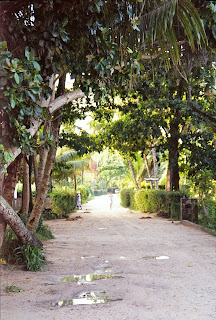It is now two months since my father decided to stay in bed and keep his eyes shut most of the time, sleeping, dozing, waking for brief moments. Sometimes, he seems to be aware of time and place, mostly not. He is calm. No medication.
Some researchers think that one of the reasons why humans have become thinking beings is because we have to make a lifelong effort to deny our mortality.
I read that from a psychological point of view, our dying begins as soon as we become aware that our death is imminent. As soon as this awareness determines our life.
I read about research where young people were asked to imagine their eventual death and most described it like a wind-up toy, you know one that runs and runs and runs, losing a critical function, a bit like a broken gearbox that forces it to stop working - a sudden death, unexpected, out of full health. But very few of us will die like that, because our body is too complex a machine for that.
Remember, our body is supported by more than 200 bones, more than 600 muscles perform our movements. When we are in a hurry, our heart beats more than a hundred times a minute, pumping blood with such pressure that we can hear it ringing in our ears. Our brain, barely three pounds of tissue, generates our thoughts, actions, memories, dreams, sends impulses through our nerve cords at an incredible speed. We are made up of billions of critical components, some self-repairing at full speed, some duplicated again and again throughout life - we are more complex than a power station. Such a system rarely stops in one fell swoop. It happens gradually.
From 30 onwards, our heart loses strength. From 40, the muscles lose mass. From 50, the density of the bones diminishes. From 60, on average, a third of our teeth are missing. From 70, the brain in the skull has shrunk.
We wear ourselves out until we can't do it any further. Then the system falls apart. And even that is usually slow.
When we die in old age we can call ourselves lucky. We did not drown while fleeing. We were not taken in the dark of night and killed. We did not die during birth or shortly afterwards, not in war, not from a plague, terrible wounds, an infection, a mad shooter, none of the catastrophes that bring death elsewhere.
We may even be able to choose the place where we die, maybe safe at home, maybe in a hospital with specialist care and support. And above all, with luck, we can choose whose hands will close our eyes.
I read another research paper, how some dying people speak in pictures, like my father asking for his (non-existent) hunting jacket, organising catering for his birthday. The symbolic language of the dying they call it.
My father drinks less and less. The doctors tell us that his body will slip into a state of dehydration that is natural in the last stages of dying. They tell us that his body is releasing neurotransmitters dulling any pain. They tell us that his skin still feels touch, that he can still hear us. But he is already so distant, like in another world, maybe he also sees and hears people we don't.
His breath is still regular, no sign of Cheyne-Stokes respiration as yet, but could be any day now, we are told. Or maybe another month. His skin is waxy pale.
I read another bit of research, about the last hours, how the activity of our brain begins to die down. Some researchers think that during this time our body floods our brain with serotonin and endorphins. The same hormones we experience when we fall in love, have sex, experience euphoria. I read of an experiment with anesthetized rats, in the seconds before they died, their brain waves flared up more than they did in life.
Maybe this is just a last gasp of a dying brain desperately trying to figure out what is happening or maybe it's a beautiful final firework sending us off.
But there's the problem with all the stuff I read, research on dying in the language of science is always etic, i.e. obtained by observation from the outside, never emic, i.e. based on descriptions from the dying person. (For more on emic and etic, click here.)
Whatever, dying is the exact opposite of control and I wonder if or when my father accepted this, whether as defeat or blessing. Maybe he didn't need to. I'll never know.
Anyway, it could be weeks.




